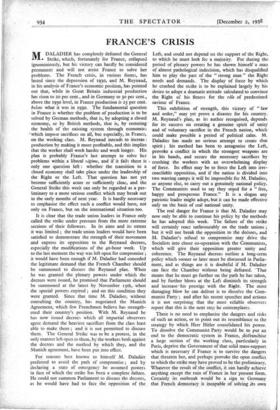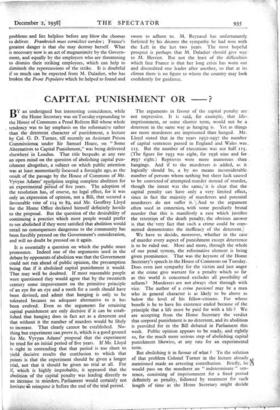FRANCE'S CRISIS
DALADIER has completely defeated the General .0.!1- • Strike, which, fortunately for France, collapsed ignominiously, but his victory can hardly be -considered permanent and will not 'assist France to solve her problems. The French crisis, in various forms, has lasted since the depression of 1930, and M. Reynaud, in his analysis of France's economic position, has pointed out that, while in Great Britain industrial production has risen to 20 per cent., and in Germany to 3o per cent., above the 1930 level, in France production is 25 per cent. below what it was in 1930. The fundamental question in France is whether the problem of production is to be solved by German methods, that is, by adopting a closed economy, or by British methods, that is, by restoring' the health of the existing system through economies which impose sacrifices on all, but especially, in France, on the working class. M. Reynaud intends to increas production by making it more profitable, and this implies that the worker shall work harder and work longer. His plan is probably France's last attempt to solve her problems within a liberal regime, and if it fails there is only one question left : whether the transition to a closed economy shall take place under the leadership of the Right or the Left. That question has not yet become sufficiently acute or sufficiently clear, and the General Strike this week can only be regarded as a pre- liminary to a more serious conflict which may break out in the early months of next year. It is hardly necessary to emphasise the effect such a conflict would have, not only on France, but on the international situation too.
It is clear that the trade union leaders in France only called the strike under pressure from the more extreme sections of their followers. In its aims and its extent it was limited ; the trade union leaders would have been satisfied to demonstrate the strength of their movement and express its opposition to the Reynaud decrees, especially the modifications of the 4o-hour week. Up to the last moment the way was left open for compromise ; it would have been enough if M. Daladier had conceded the legitimate demand that the French Chamber should be summoned to discuss the Reynaucl. plan. When he was granted the plenary powers under which 'the decrees were issued, he promised that Parliament should be summoned at the latest by Noventher 5th, - when the special. powers expired ; and on this condition they were granted. Since that time M. Daladier, without consulting the country, has negotiated the Munich Agreement, which few Frenchmen believe has strength-
ened their country's position. With M. Reynaud he has now issued decrees which all impartial observers agree demand the heaviest sacrifices from the class least able to make them ; and it is not permitted to ditcuss them. The General Strike was to be a protest; in the only manner left open to them, by theWorkers both against the decrees and the method by which they, and the Munich agreement, have been puf into effect.
For reasons best known to himself M. Daladier preferred to avoid the path of compromise ; and by declaring a state of emergency he assumed powers in face of which the strike has. been a complete failure. He could not summon Parliament to discuss the decrees, as he would have had to face the opposition of the
Left, and could not depend on the suppOrt of the Right, to which he must look for a majority. For during the period of plenary powers he has shown himself a man of almost pathological indecision, which has disqualified him to play the part of the " strong man " the Right
needs and demanda. The display of force by which he crushed the strike is to be explained largely by his desire to adopt a dramatic attitude calculated to convince the Right of his fitness for the role of predestined saviour of France.
This exhibition of strength, this victory of " law and order," may yet prove a disaster for his country. M. Reynaud's plan; as its author recognised, depends for its success on creating a genuine spirit of unity and of voluntary sacrifice in the French nation, which could make possible a period of political calm. M. Daladier has made no serious attempt to create that spirit ; his method has been to antagonise the Left, provoke a conflict in which the strongest weapons are in his hands, and secure the necessary sacrifices by • crushing the. workers with an overwhelming display of force. Its effect may be to force the Left into irre- concilable opposition, and if the nation is divided into two warring camps it will be impossible for M. Daladier, or anyone else, to carry out a genuinely national policy: The Communists used to say they stood for a " free, happy and prosperous France." It is a slogan any patriotic leader might adopt, but it can be Made effective only on the basis of real national unity.
The real danger for France is that. M. Daladier may now. only be able to continue his policy by the methods he has adopted this week. The failure of the strike will certainly react unfavourably on the trade unions ; but it will not break the opposition to the decrees, and M. Daladier's refusal to compromise may drive the Socialists into closer co-operation with the Communists, which will give their opposition greater unity and coherence. The Reynaud decrees outline a long-term policy which sooner or later. must be discussed in Parlia- ment, and as things are it is doubtful if M: Daladier can face the Chamber without being defeated. 'That means that he must go further on the path he has taken, and by fUrther blows at the Left diminish- its strength and increase • his prestige with Right. the most damaging blow he can deliver is to dissolve the Com- munist Party ; and after his recent speeches and actions it is not surprising that the most reliable obserVers report that this is the next step he 'contemplates.
There is no need to emphasise the dangers. and risks of such an action, or to point out its. resemblance to the strategy by which Herr Hitler consolidated his power. TO dissolve the Communist Party would be to .put an end, to the democratic system in France, disfranchise a large section of the working class, particularly in Paris, deprive the GoVerninent of that solid mass-support which is necessary if France is to survive the dangers that threaten her, and perhaps, Provoke the open conflict to which the strike may have proved to be the prfliminary. Whatever the result of the COnflict; it can hardly achieVe anything except the ruin of France in her present form. Certainly its outbreak would be a sign_ to Germany that French democracy, is _incapable of solying ,its own problems and lies helpless before any blow she chooses to deliver. Frankreich muss vernichtet werckn ; France's greatest danger is that she may destroy herself. What is necessary now is an act of magnanimity by the Govern- ment, and equally by the employerS who are threatening to dismiss their striking employees, which can help to diminish the repercussions of the strike. It is doubtful if so much can be expected from M. Daladier, who has broktn the Front Populaire which he helped to found and swore to adhere to. M. Reynaud has unfortunately forfeited by his decrees the sympathy he had won with the Left in the last two years. The most hopeful prospect is perhaps that M. Daladier should give way. to M. Herriot. But not the least of the difficultieS which face France is that her long crisis has worn out and discredited one leader after another, so that at its climax there is no figure to whom the country may look confidently for guidance.



























































 Previous page
Previous page